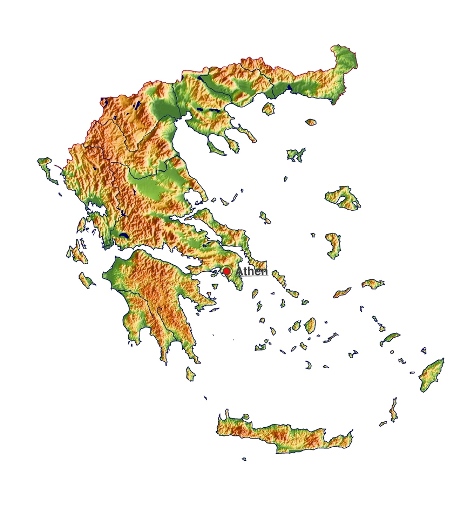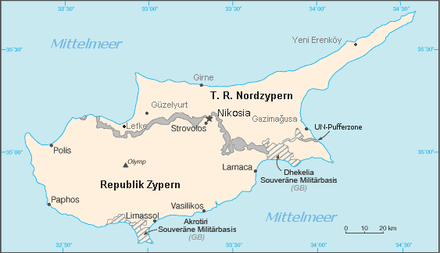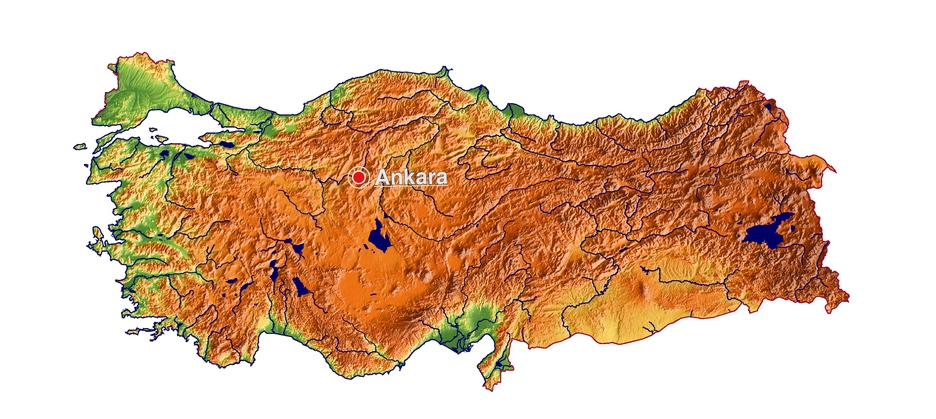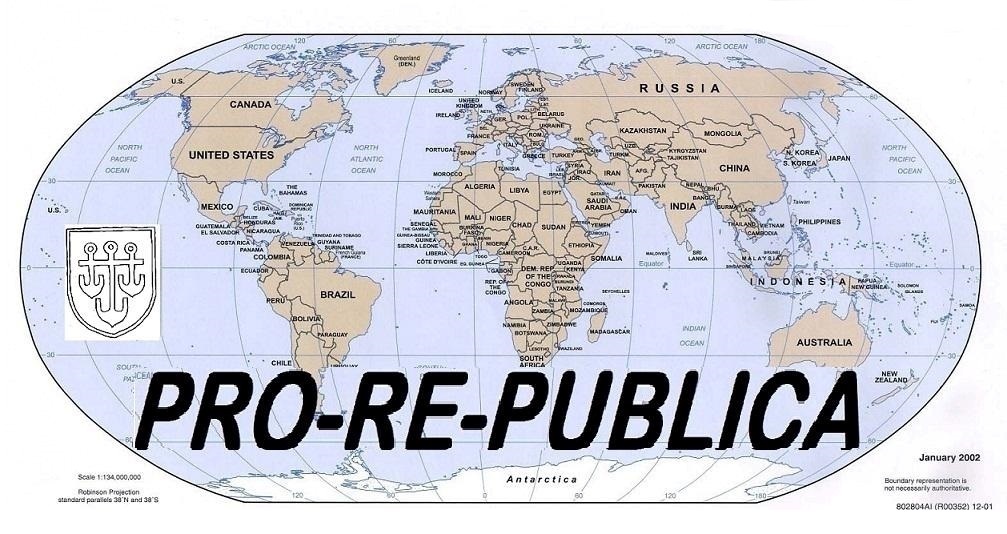The Cyprus Conflict - The United Nations at Fault
Der Zypernkonflikt - Ein Fehler der Vereinten Nationen
for the German version click here
A Subpage to the Page:
pro-re-publica.de
2012 05 22 / Images added 2016 07 22 / 2017 04 21 / Rearranged 2017 09 19
|
|





Landkarte Griechenland by GinkgoMaps CC BY (c) Orlando Fernandez (c) Weltkarte.com (c) Türkische Republik von Nordzypern Landkarte Türkei by GinkgoMaps CC BY
* 10th January, 2015 (amended 11th March, 2015, revised 19-9 and 31-12-2017)
| 1 |
The Conflict. The Cyprus Conflict consists of the claim invented by the Greek Cypriots to reign over the whole island and the claim held by the Turkish Cypriots to govern themselves within part of the island's territory. The conflict gains weight through the respective "motherlands"; of its parties, Greece and Turkey entangled in their relationships with each other and with other countries, supporting their clients in Cyprus. It is aggravated by the UN, the EU and most governments denying communication with the Turks of the island as a State, referring them instead to an agreed establishment of a common Cypriot State with the Greek Cypriots. The UN and the EU and certain governments have thus assumed the role of additional partners to the Conflict on the side of its Greek partner. This role contrasts with that of arbiters as claimed by the UN and the EU and the governments mentioned. An agreement on conditions for the formation of a Greek-and-Turkish State of Cyprus has not been reached in 50 years of negotiations. Instead, at the latest since 1955, the Greek Cypriots have employed every means to harm the Turkish Cypriots in order to enforce their submission. Given this Greek attitude and the denial of political equality to the conflicting parties, no viable agreement can be expected. |
| 2 | Alternatives for ending the Conflict. For ending the Conflict, four alternatives exist: I. Unconditional surrender of the Turkish Cypriots to the Greek-Cypriot claims as a result of the application of military or quasi-military force. II. Greek agreement with Turkish self-government in part of the island's territory. III. Voluntary submission of the Turkish Cypriots to Greek-Cypriot superiority under conditions accepted and obeyed by the Greek Cypriots. IV. The UN, the EU and/or a number of relevant governments recognize the Turkish Cypriot State existing in part of the island's territory without consent of the Greek conflicting party. (1) Alternative I. must be left out of consideration because no power exists able or willing to break the prospective Turkish resistance. Moreover, the UN, the EU and relevant governments have called upon each other not to violate the defacto-border delimitating the territories inhabited by Greek and Turkish Cypriots. (2) Alternative II. has no chance of realization as long as the UN, the EU and relevant governments deny recognition of Statehood to the Turkish Cypriot community. For as long as this stance prevails, the Greek conflicting party is able to derive advantages from upholding its claim of much greater weight than that of disadvantages resulting from Turkish reactions. (3) Alternative III. can hardly be envisaged without provisions of Turkish co-determination in a common state similar to that provided for in the 1960 Constitution. This would however collide with the interest of the Greek Cypriots in unlimited rule over even part of Cyprus prevailing over its interest in a common state implying Turkish co-determination. As long as the possibility appears to exist of the Turkish Cypriots being forced, by the disadvantages connected with non-recognition of their state, to renounce to self government or its durable protection, alternative 3. is also hampered by the Greek interest in the chance of gaining sovereignty over the whole island with the Turkish Cypriots in it. Even if the Greek side were prepared for co-determination, an additional impediment to its realization consists in the recently accumulated national debt of the Greek Republic of South Cyprus in which the Turkish side cannot be expected to participate. (4) Alternative IV. would end the Conflict, because it would discontinue the chance for the Greek conflicting party of gaining supremacy over the whole island and would thus dissolve the substance of the Conflict. This option has recently gained some ground in international public opinion. |
| 3 |
The choice between the alternatives. The question which alternative merits priority should be considered from the aspect of durable peace. This aspect is linked with the interests of foreign powers involved and even of the "family of nations". The aspect includes the meaning of International Public Law for the Cyprus Conflict. |
| 3.1 | Guideline of highest priority: Absence of violence. As peace requires the absence of violence, alternatives which are connected with a relevant potential for future violence must be excluded. Under the conditions prevailing in Cyprus, this applies to alternatives involving subjugation of the Turkish Cypriots, be it by means of military force or other forms of compelling pressure. This is due to prospects of successful durable assertion of the claim for self government with the help of Anatolian and Cypriot Turks prepared for a high degree of sacrifice. This prospect can probably be reduced by international pressure so that activities are postponed, but only at the price of more vigilant reappearance as circumstances change. This is not paralleled by any similar prospect of durable enforcement of the Greek claims. Because the ethically highly esteemed ideal of self government, enhanced by the interest in common welfare and relying on national support from the neighbourhood affords higher political weight than interests of the Greek Cypriots (whose enjoyment of self government is secured and unchallenged and accompanied by every chance of prosperity) in subjugating the Turkish Cypriots and possessing a greater part of the island's territory. This argues against solutions of a pattern like that of the Annan-Plan. An attempt at a voluminous and vast regulation of a great number of conceivable individual conflicts as forms the substance of this plan creates additional food for dispute without deciding the underlying basic conflict. It puts the Greek party in a position enabling it to pursue further their claim for supremacy by diligently utilizing powers and plan-positions. It is therefore bound to increase rather than terminate the Conflict. Even if the Turkish Cypriots or their leadership are successfully deceived about this consequence, their concurrence serves only to postpone the renewed outbreak of dispute into the future. Moreover, the real conditions prevailing in Cyprus struggle against any "solution" that misses an effective, power-based assurance of Turkish Cypriot territorial self government. Permanent peace requires at the least autonomous Turkish executive power and court jurisdiction not subject to any Greek influence. Given the present stage of negotiations the position of the Greek conflicting party is far removed from such an option. Therefore, Alternative 4. alone appears compatible with permanent peace. Given the latent policy of the UN, the EU and relevant governments, no durable agreement can be expected from the conflicting parties. Even if an agreement were brought about by means of pressure, it would not promise permanent pacification. Whether the Conflict continues or is brought to a definite end lies therefore in the hands of the powers and governments mentioned. |
| 3.2 | More specific stipulations. It is true that absence of violence does not suffice for peace deserving that name. Peace in a meaning corresponding with the essential substance of man requires a certain measure of order and adequate solution of conflicts by enforcement or equalization of interests. The policy applied to Cyprus by the United Nations, by Europe and by relevant governments since 1960 is guided by certain formalities. It relies in particular on the assumption that legitimacy or illegitimacy of statehood in Cyprus and its territorial scope are based solely on recognition by the UN and/or relevant governments and that the creation of the Turkish State of North Cyprus must be punished with non-recognition and all its grave consequences for the population purely because of the application of force involved. Peace in the meaning mentioned depends however on many factors of cohabitation like for instance factors pertaining to ethics, religion, civilization, tradition, economy, supply of goods and services, relationships of military and other powers or to property. It also depends on aggressive or tolerant inclinations of the population of a relevant environment. The exclusion of all these factors from the foundation of the international policy towards Cyprus adds decisively to the fact that it was impossible to end the Conflict in spite of decades long efforts. The development of substantial parameters for peace around Cyprus and their application to the Conflict results in alternative 4. as described above and consisting of a termination of the Conflict by recognizing the quality of the Turkish Republic of North Cyprus as a State not only to be recommended as a means to prevent future violence but also to be preferred in the interest of permanent substantial pacification. |
| 3.2.1 | The deeply established Greek quest for superiority. By international comparison, the Greek and Turkish Cypriot communities are more strongly than others characterized as different in many respects and consolidated by their ethnicity, religion, culture and tradtion. On the Greek side, this consolidation and characterization is reinfoced by particularities of the orthodox church and by its alliance with the national movement of the 19th century. In the second half of the 20th century, this alliance led (in a way typical for diaspora conditions) to a combination of the political power accumulated within the Greek community with the religious authority of the clergy which forms, together with its clientele, a stringently organized Greek-Cypriot hierarchy. This development culminated (since 1950) in a claim for supremacy entertained by the whole Greek community under Archbishop Makarios and based on a historicising hybrid Hellenic ideology. This intensified the contrast of the Greek against the Turkish community much more effectively than the loose organization and religious or ideological orientation of the Turkish side. Not this difference between the communities as such but the claim of the Greek community for supremacy constitutes the decisive factor preventing peace in Cyprus because such supremacy amounts to foreign rule entailing the probability of negative effects on and discrimination of the Turkish community. Regardless of whether such foreign rule or discrimination emanates from a monarch or from a larger community or "majority" or another stronger power, this probability justifies a claim for self government. The superior interest in securely providing peace with the help of government power may, under certain conditions, demand renunciation to self government if the probability of discrimination is slight, particularly if it is reduced through the safeguard of basic or special rights for the inferior group and - in cases where a community is composed of members of different religions - of a separation of government an religion. The Greek conflicting party considered the violent pursuit of its claim for self government since 1955 as justified by the foreign nature of and the probability of discrimination connected with British rule. The Greeks would not be satisfied with special rights. When discrimination of the Turkish community, which had resisted the Greek recent violent fight for union with Greece and had become victim of pogroms in return, became imminent at the withdrawal of British sovereignty over the island (1960), the Turkish Cypriots were prepared to accept the probability on condition of guarantees for enumerated special rights. Treaties and a constitution to this effect were written down and signed, albeit, on the part of the Greek side, with the reservation to continue pursuing their claim for unlimited sovereignty which was published almost at the same time. In 1963 and 1964 the Greek leadership acted in breach of the special Turkish rights and formally declared their abolishment. In the Cyprus Conflict, the probability of discrimination and foreign rule became certainty. It was realized by the Greek Cypriots attempting since 1955 (organized murderous campaign under Grivas and Makarios) to violently subjugate the Turkish Cypriots, particularly in 1963/64 by means of Turkish pogroms conducted by irregular armed fighters that were instructed by the Greek part of the designated government of "Cyprus", and in 1974 by military intervention of Greece. The certainty of imminent discrimination continues unto the presence due to explicit maintenance of the Greek aim for supremacy and due to the Greek policy of harming a the Turkish Cypriots as intensely as possible on every occasion that presents itself in order to compel their submission. The Cyprus Conflict is thus characterized by Greek attacks against the requirements for peace in Cyprus and by Turkish defence against these attacks. Greek aggression constitutes the decisive obstacle for peace around Cyprus. |
| 3.2.2 | Weighing Greek and Turkish interests.
Surrendering the island to Greek rule would amount to a much more severe reduction of the position of Turkey in the Eastern Mediterranean Sea than the surrender of a smaller part of the island would mean for the Greek position. In this context, realistic political evaluation cannot leave aside the nearness of the island to the Anatolian main and its distance from Greece in relation to its size as well as its limited economic and greater military importance. It is true that by the partition brought about by Greek policy, both communities loose part of their area of settlement, but gain unlimited self government. It is precisely this interest in self government which was used by the Greek conflicting party in reasoning their own aggressive terrorist and military violence and their claim for supremacy from 1950 onwards, while they denied the same right to the Turkish community. The Greek demand for supremacy upheld in negotiations about unification since 1964 endangers the security of the Turkish community which raises no similar claim. Its quest for security gains weight through the larger Greek population of the island, through their ideological efforts, through violent Greek aggression between 1955 and 1974 and through the Greek policy demonstrating since 1964 their resolution of harming Turkish Cypriots according to opportunity. By arranging the pogroms against the Turkish Cypriots in 1963/64 instead of rendering the government protection they owed to the Turkish community, the Greek leadership, then forming part of the "government of Cyprus"; gave evidence of the need of the Turkish community of a State of their own as a basic requirement for peace. Accordingly, adequate participation of the turkish Cypriots in advantages deriving from unification under Greek rule cannot be expected. It is true that partition of the island results in a considerably larger personal loss of home and property on the part of Greek than on the part of Turkish Cypriots. However, viewed from the aspect of interest in peace this attribution of loss constitutes a compensation justified by the responsibility of the Greek community for its violent aggression and breach of confidence in the course of the attempt at founding a Republic of Cyprus in 1960 and for its failure. Moreover, the loss has lost considerable weight due to the economic development of South Cyprus, and there remains the possibility of compensation not only within the Greek but also between the Greek and Turkish communities. For the same reasons for which it grants peace to Cyprus, partitioning the island will, in spite of being unpopular in Greece, serve peace between Turkey and Greece as well. The same applies to other substantial international interests or conflicts as may be connected - albeit hardly visible - with Cyprus. In particular, an interest in an expansion of the EU cannot be regarded as serving in itself the interests of peace. In the case of the Cyprus it contributes to the contrary to the aggravation and continuation of the Conflict. |
| 3.2.3 |
Separation as an agent for rapprochement. Not only does a permanent sustained solution of the Cyprus Conflict, particularly taking into account the Greek and Turkish differences mentioned, require the burial of any chance for Greek supremacy. This burial and the restoration of equality of social and political status of the two Communities would also provide the only chance for a future friendly exchange that might even result in the establishment of some sort of a federation between them. Separation of irreconcilable partners has recently proven its capacity as an agent for rapprochement in the case of the Czech and Slovak republics. |
| 4 | Inadequacy of the international attitude adopted
from 1963 onwards. To be discussed under aspects of interests of peace remain the reasons on which the international policy towards the Cyprus Conflict (UN, EU, relevant governments) is based. This meets with the difficulty that such reasons are only vaguely documented. Numerous private or scientific opinions exist but they lack authority as they are subject to dispute. Official evaluation of subject matters of the kind dealt with in sections 4.2.1 and 4.2.2 of this homepage are almost completely missing. Sources for binding evaluations are restricted to the resolutions of the Security Council of the United Nations, because positions held by the EU or relevant governments restrict themselves to adopting the contents of such resolutions and do not go beyond their meaning. They all amount to the assumption that in 1960 a Republic of Cyprus was created which continues to exist and enjoys the protection extended to States by international public law (1) and that the violent creation of the Turkish Republic of North Cyprus is incompatible with this protection (2). Therefrom derives an obligation not to recognize this Turkish Republic (3). As concerns the Cyprus Conflict, these considerations prove incompatible with the interest in permanent peace. (1) A notion of the State designed to support the interests of peace must be defined by an in fact and permanently existing supreme power governing a defined territory. Towards this definition, the meaning of international recognition or non-recognition is confined to its reasoning concerning the fulfilment of requirements of the notion of the State in an individual case. Instrumentalizing the notion of State for the pursuit of particular interests is bound to damage the interests of peace. Since 1960 or, at the latest, since 1963, the formation of such a power of State covering the whole territory of Cyprus has been hampered by the Greek Cypriot powers detaching themselves from the co-government of the Turkish Cypriot powers (which the Greek leadership had merely pretended to concede) without which the establishment of a supreme power over all Cyprus proved impossible. This is why the Greek Cypriot community is entitled to the protection accorded to States by international law only in so far as it has established a supreme power over a defined part of the territory of the island since 1974. (2) As no "Republic of Cyprus" comprising both communities (as defined ba the Constitution of 1960) existed during the steps taken between 1964 and 1984 towards the establishment of a Turkish Republic of North Cyprus and as boundaries of the Greek State of Cyprus in being from 1964 onwards were not established before its delimitation in 1974, the powerful help rendered by Turkey to the establishment of the Turkish Cypriot State could not contradict any right of a Cypriot State. But even if Turkish force had encroached upon Greek rights, this would have been necessary in order to counteract the breach of the Cyprus peace treaties of 1959/60 by Greek violence directed at subjugating the Turkish Cypriots. Moreover, the turkish exercise of power was based on a treaty right of intervention. (3) Eventually no international law can prevent the foundation of States or the changing of State territory even if violently performed if this performance constitutes the only remedy for the preservation of durable peace, because international law enjoys no other legitimacy than the service it renders to peace. The concept of any and all instances of violence forming a legal obstacle for the creation of a State or for an change of State territory or forming the basis for non-recognition or for an obligation of non-recognition is incompatible with the notion of State deriving from the task of establishing peace. Therefore, contrary to the opinion probably held by a majority of authors, a rule containing such obligation cannot gain validity in any of the forms in which international law can originate, and particularly not by observance which is the only form claimed as a source for the obligation of non-recognition of the Turkish Republic of North Cyprus. This rule is verified by attempts at realizing the rights in question having repeatedly resulted, without attainig their objective, in massive strife of greater scale, and by violently enforced changes creating permanent peace. Violent changes in the world of States cannot be prevented and are once and again needed in the interest of peace. They are present all through the order of the day of history and gain by permanence the quality of customary law. It cannot however be excluded but must be recognized as a basic rule, that the foundation of a State in connection with an encroachment on an existing State contravenes the interests of peace. Therefore, non-recognition as a means of repairing the encroachment can prove necessary in the interest of peace. The correct evaluation as a condition or as an obstacle for peace cannot be derived from mere formalities but can only be ascertained by applying criteria of the kind discussed in sections 4.2.1 and 4.2.2 of this article. In any case, non-recognition as a sanction against violence serves peace only if a chance exists for the attainmemt of the result pursued and if the peace-providing effects clearly outweigh the disturbance of peace connected with it. To the Cyprus Conflict, none of the requirements for the sanction of non-recognition applies. Non-recognition prevents pacification of the island. The call by the UN Security Council for non-recognition contrasts with its call to respect the borders of the Turkish Cypriot Republic, thus preventing the realization of purported rights of the Greek community. As has becomne evident after 50 years since its proclamation, the sanction cannot enforce its objetive. Most importantly, the detriment inflicted on the Turkish Republic and first of all on its population and on a peaceful situation (damages caused in its creation having been widely overcome) by means of the embargo connected with non-recognition preventing international communication including the exchange of goods and services and in particualr of transport services is out of proportion with the objective of supporting the Greek interest in supremacy by prohibiting Turkish self government. In this context it should be noted that even the United Nations have not enacted or proclaimed a legal obligation of relevant governments not to recognize the Turkish Republic of North Cyprus. As the recommendation of non-recognition contained in resolutions of the Security Council is not expressly based on Chapter VII (Art. 41) of the UN-Charta, they have no legally binding effect. |
| 5 | Concerning arguments used herunto to support the Greek
case. Other arguments used in favour of the Greek claims, the validity of which could be claimed to derive from the support given to the principles pursued by the internationally prevailing Cyprus policy (these arguments not being used officially in the context of the policy of the United Nations) call for the following remarks: (1) Partition as advocated in the present homepage results in the destruction of rights of residence and property of Greek and Turkish Cypriots. These rights must be required to stand down to the interests of peace. The loss of such rights is the result of the violent unpeaceful treaty-despising policy of the Greek leadership of the majority of those affected and must be compensated within their community. As concerns damages suffered by the Turkish community, their behaviour proves sufficiently their preference of security and self government to their surrendered rights. They are entitled to reparations payments by the Greek Republic of Cyprus. It is true that, while the loss of settling territory for Greek Cypriots is less than one third and that for the Turkish Cypriots more than two thirds of the territory of the island, the number of the affected Greek Cypriots and the extent of property taken from them is several times as large as the loss suffered on the Turkish Cypriots. This is the consequence of the distribution of settlement of the Greek and Turkish Cypriots over the whole island before the violent changes caused by the Greek community that culminated in enforced migration of more than 100.000 Greek and more than 20.000 Turkish Cypriots to the south and the north of the island respectively. It also reflects the overwhelming power employed and threatening to be employed by the Greeks of Cyprus in the violent pursuit of their aspirations and the inferiority of the Turkish Cypriots. Arguably, however, the interests of permanent peace may require a certain adjustment of this relationship through ontercommunal restitution or compensation. Justified mutual claims can be raised pursuant to the recognition of the Turkish Republic of North Cyprus. (2) The Greek party claims that Greek rule over Cyprus derives from the majority principle of democracy as the type of government best serving the interest in peace. This argument os bound to impress a superficial public opinion, but ignores the reliance of the majority principle on the compensation of interests afforded by a constantly changing formation of majorities within the limits of certain common basic interests of a homogeneous "demos". This requirement cannot materialize in a relationship like that of the communities of Cyprus between a closed majority and a closed minority that pursue permanently opposed ideals in basic matters of political cohabitation. (3) Another argument close to the prevailing policy holds that State borders should define a territory large enough to enable the existance of a community and that they should coincide with geographical unities. The island of Cyprus should therefore belong to one single State and not be divided. The economic uprise of the Greek Republic of South Cyprus since 1964 proves however that it does not depend on unification. Independent prosperity of the Turklish Republic is prevented primarily as a result of non-recognition. Any and all advantages to be expected from cooperation can be realized through recognition, for example on a federal basis. (4) It is occasionally concluded from peaceful coexistence of the two communities of Cyprus during long periods of history that the allegation of impossibility of the cohabitation of the Cypriot communities goes back to their preoccupation with facil and superficial or imposed sentiments or interests, which can be overcome with the help of the sanction of non-recognition. This view overlooks the violent pursuit of the Greek claim for supremacy which could and can, since its origin, be contained only by the superior powers vested in Osman rule and, from 1878 onwards at least until 1955, in the British government rule and since 1974 by Turkish troops present in the island. |
| Conclusion
The most promising if not the only way of securing peace around Cyprus is by recognizing the Greek Republic of South Cyprus and the Turkish Republic of North Cyprus as equally legitimate States on the island. An agreement of the conflicting parties to this effect reducing conflicts between bilateral interests would be helpful. An agreement could and should deal with the delimitation of the territories of the two States, with diverse claims and compensations, with the deployment of military forces, and provide cooperation, for example within the framework of the European Union, it should deal with rights of settlement and with the management of residual rights deriving from the Cyprus Treaties of 1959/60. Such agreements can (only) be expected if and as soon as the Turkish Republic of North Cyprus has been recognized or as its recognition becomes imminent without any doubt. Therefore, ending the Conflict lies primarily not in the hands of the Greek and Turkish conflicting parties but in the hands of relevant governments or their organisations endowed with the competence for such recognition. |
|
Cyprus Conflict - Overview |
|
|
|
On the question of the compatibility of the admission of Cyprus into the European Union with international law, the law of the EU and the Cyprus Treaties of 1959/60. Appraisal study presented to the Republic of Turkey by Dr. Christian Heinze (attorney-at-law), Munich, in March 1997. |
|
|
|
The Case for Political Parity of Turkish Cypriot vis-a-vis Greek Cypriot Governments, London 1988, Talk held in a Seminar organized by Britisch Parliamentarians. |
|
|
|
|
|
|
|
The Cyprus Conflict, the Western Peace System is put to the Test, Europa-Archiv, 1964, S. 713-726. |
|
Majority Rule means War (1964). Deutsche Zeitung Nr. 15 v. 18./19. Jan. 1964, S. 3 |
|
Basic Literature on the Cyprus Conflict |
|
|
|
All contributions by the author of this homepage on the Cyprus Conflict, in part linked with their full wording. |

